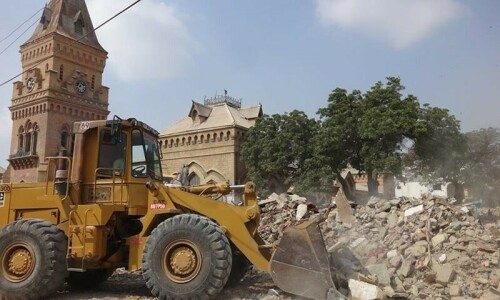The Supreme Court (SC) on Thursday ordered private entities and government authorities, provincial and federal, to remove all encroachments made on pavements for security purposes within three days.
A three-judge bench of the apex court, headed by Chief Justice of Pakistan (CJP) Qazi Faez Isa alongside Justices Jamal Khan Mandokhail and Naeem Akhtar Afghan was hearing a 2010 petition filed by former Karachi mayor Naimatullah Khan seeking the SC’s intervention to get amenity plots vacated from “land mafia and political parties” in the city, as well as around 145 other related cases regarding encroachments on public spaces, illegal constructions and conversion of residential properties into commercial ones.
After the proceedings of the Gujjar, Orangi and Mehmoodabad nullah cases concluded for the day, Justice Isa remarked that the government had greater responsibility to answer for any encroachments by it.
He said pavements outside the Governor House, Chief Minister House, Naval Headquarters, rangers headquarters and the SC were all encroached on by the government, adding that he had gotten all such constructions removed from outside the apex court’s Karachi registry.
“Do you have a right to close off the pavements?” CJP questioned an additional advocate general of Sindh to which the latter replied: “No, but these [encroachments] are made to ensure security [of these offices and buildings] from threats of bombs.”
Justice Isa next asked, “So the public can be attacked but you should remain safe. What kind of law is this?”
The chief justice subsequently directed that all pavements outside provincial and federal government authority offices and private entities should be cleared or the court would issue contempt notices to those who blocked them.
He said that pavements were meant for pedestrians and if the authorities wanted to barricade access to their buildings then they needed to do it inside their premises.
“They do it outside because how can they let anything happen to their lawns,” CJP Isa remarked.
He emphasised that barricading around the world was done inside buildings while “pavements are for the public”. “If law enforcement agencies are so scared then they should leave these places and make their offices in remote areas,” CJP Isa added.
The Sindh advocate general assured the court that the government would remove all encroachments from pavements.
Addressing the advocate general and the federation, CJP Isa said, “It is unfortunate that encroachments are made by those who are paid by the public exchequer. You are here to serve the people, not protect yourself.”
Dictating the order of the day, Justice Isa, directed all land-owning agencies to remove all encroachments from pavements within three days.
After three days, he said encroachments should be demolished by the relevant authorities, adding that the cost of that exercise would be paid by the most senior officer in the building at fault.
Karachi Metropolitan Corporation counsel Umar Lakhani assured the court that all encroachments on pavements alongside the 106 roads under the body’s jurisdiction would be cleared.
The case was subsequently adjourned for tomorrow.













































Dear visitor, the comments section is undergoing an overhaul and will return soon.